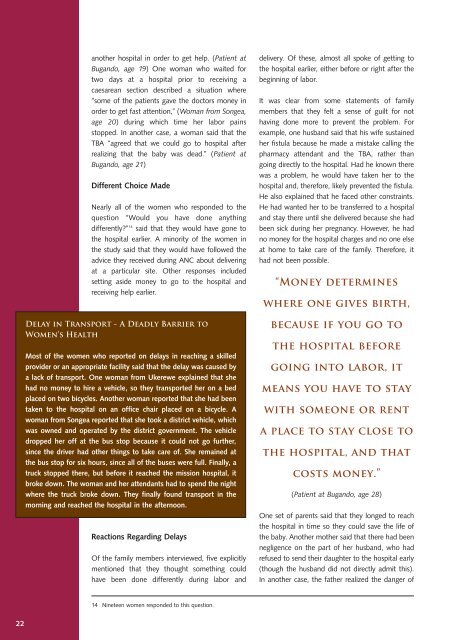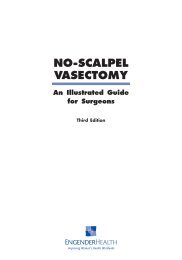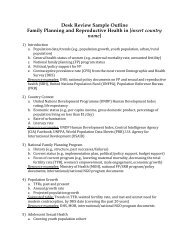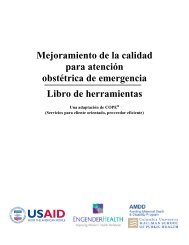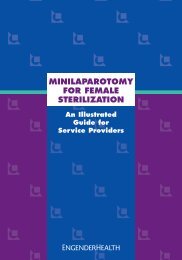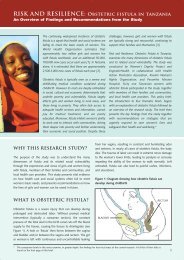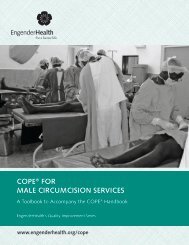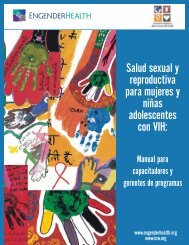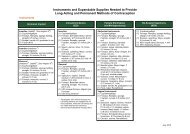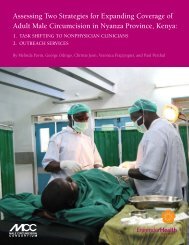Risk and Resilience: Obstetric Fistula in Tanzania - EngenderHealth
Risk and Resilience: Obstetric Fistula in Tanzania - EngenderHealth
Risk and Resilience: Obstetric Fistula in Tanzania - EngenderHealth
You also want an ePaper? Increase the reach of your titles
YUMPU automatically turns print PDFs into web optimized ePapers that Google loves.
another hospital <strong>in</strong> order to get help. (Patient at<br />
Bug<strong>and</strong>o, age 19) One woman who waited for<br />
two days at a hospital prior to receiv<strong>in</strong>g a<br />
caesarean section described a situation where<br />
“some of the patients gave the doctors money <strong>in</strong><br />
order to get fast attention,” (Woman from Songea,<br />
age 20) dur<strong>in</strong>g which time her labor pa<strong>in</strong>s<br />
stopped. In another case, a woman said that the<br />
TBA “agreed that we could go to hospital after<br />
realiz<strong>in</strong>g that the baby was dead.” (Patient at<br />
Bug<strong>and</strong>o, age 21)<br />
Different Choice Made<br />
Nearly all of the women who responded to the<br />
question “Would you have done anyth<strong>in</strong>g<br />
differently” 14 said that they would have gone to<br />
the hospital earlier. A m<strong>in</strong>ority of the women <strong>in</strong><br />
the study said that they would have followed the<br />
advice they received dur<strong>in</strong>g ANC about deliver<strong>in</strong>g<br />
at a particular site. Other responses <strong>in</strong>cluded<br />
sett<strong>in</strong>g aside money to go to the hospital <strong>and</strong><br />
receiv<strong>in</strong>g help earlier.<br />
Delay <strong>in</strong> Transport - A Deadly Barrier to<br />
Women’s Health<br />
Most of the women who reported on delays <strong>in</strong> reach<strong>in</strong>g a skilled<br />
provider or an appropriate facility said that the delay was caused by<br />
a lack of transport. One woman from Ukerewe expla<strong>in</strong>ed that she<br />
had no money to hire a vehicle, so they transported her on a bed<br />
placed on two bicycles. Another woman reported that she had been<br />
taken to the hospital on an office chair placed on a bicycle. A<br />
woman from Songea reported that she took a district vehicle, which<br />
was owned <strong>and</strong> operated by the district government. The vehicle<br />
dropped her off at the bus stop because it could not go further,<br />
s<strong>in</strong>ce the driver had other th<strong>in</strong>gs to take care of. She rema<strong>in</strong>ed at<br />
the bus stop for six hours, s<strong>in</strong>ce all of the buses were full. F<strong>in</strong>ally, a<br />
truck stopped there, but before it reached the mission hospital, it<br />
broke down. The woman <strong>and</strong> her attendants had to spend the night<br />
where the truck broke down. They f<strong>in</strong>ally found transport <strong>in</strong> the<br />
morn<strong>in</strong>g <strong>and</strong> reached the hospital <strong>in</strong> the afternoon.<br />
Reactions Regard<strong>in</strong>g Delays<br />
Of the family members <strong>in</strong>terviewed, five explicitly<br />
mentioned that they thought someth<strong>in</strong>g could<br />
have been done differently dur<strong>in</strong>g labor <strong>and</strong><br />
delivery. Of these, almost all spoke of gett<strong>in</strong>g to<br />
the hospital earlier, either before or right after the<br />
beg<strong>in</strong>n<strong>in</strong>g of labor.<br />
It was clear from some statements of family<br />
members that they felt a sense of guilt for not<br />
hav<strong>in</strong>g done more to prevent the problem. For<br />
example, one husb<strong>and</strong> said that his wife susta<strong>in</strong>ed<br />
her fistula because he made a mistake call<strong>in</strong>g the<br />
pharmacy attendant <strong>and</strong> the TBA, rather than<br />
go<strong>in</strong>g directly to the hospital. Had he known there<br />
was a problem, he would have taken her to the<br />
hospital <strong>and</strong>, therefore, likely prevented the fistula.<br />
He also expla<strong>in</strong>ed that he faced other constra<strong>in</strong>ts.<br />
He had wanted her to be transferred to a hospital<br />
<strong>and</strong> stay there until she delivered because she had<br />
been sick dur<strong>in</strong>g her pregnancy. However, he had<br />
no money for the hospital charges <strong>and</strong> no one else<br />
at home to take care of the family. Therefore, it<br />
had not been possible.<br />
“Money determ<strong>in</strong>es<br />
where one gives birth,<br />
because if you go to<br />
the hospital before<br />
go<strong>in</strong>g <strong>in</strong>to labor, it<br />
means you have to stay<br />
with someone or rent<br />
a place to stay close to<br />
the hospital, <strong>and</strong> that<br />
costs money.”<br />
(Patient at Bug<strong>and</strong>o, age 28)<br />
One set of parents said that they longed to reach<br />
the hospital <strong>in</strong> time so they could save the life of<br />
the baby. Another mother said that there had been<br />
negligence on the part of her husb<strong>and</strong>, who had<br />
refused to send their daughter to the hospital early<br />
(though the husb<strong>and</strong> did not directly admit this).<br />
In another case, the father realized the danger of<br />
14 N<strong>in</strong>eteen women responded to this question.<br />
22


